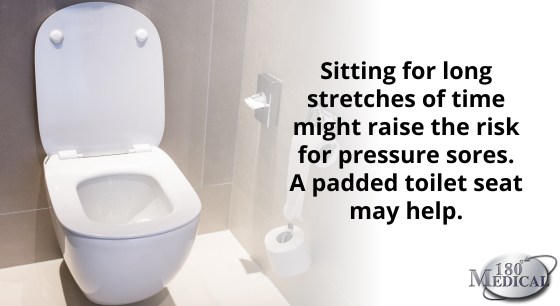 Undergoing a medical procedure often involves a lot of preparation, and a colonoscopy is no exception. When you live with a spinal cord injury, additional considerations come into play. I’d like to share some of my tips for preparing for a colonoscopy with a spinal cord injury, based on my own personal experience and research. Hopefully, I can help make this journey a little less daunting and more manageable for you.
Undergoing a medical procedure often involves a lot of preparation, and a colonoscopy is no exception. When you live with a spinal cord injury, additional considerations come into play. I’d like to share some of my tips for preparing for a colonoscopy with a spinal cord injury, based on my own personal experience and research. Hopefully, I can help make this journey a little less daunting and more manageable for you.
My Personal Colonoscopy Prep Checklist
Your gastroenterologist’s office may give you some instructions to follow as you begin preparing for your colonoscopy procedure. This may include what foods and drinks to eat or avoid and what to expect.
I prepared myself for my procedure with a few essential items:
- Padded toilet seat
- Intermittent catheters (if you use them)
- Disposable incontinence underwear
- Gloves
- Bendable mirror
My Tips for Preparing for a Colonoscopy with a Spinal Cord Injury
Remember, your gastroenterologist or general practitioner is the best resource for any medical questions or advice. However, here are a few tips that you might keep in mind, which I’m sharing from my own personal experience.
1. Talk to your urologist.
Once you know about your upcoming GI procedure, give your urologist a call and let them know about it. You may want to relay the amount of fluids you’ll be consuming. Your urologist can advise if you need to adjust any bladder medication, etc.
This may also be a good opportunity to discuss recommendations on the types of catheters that may help you during this time in order to avoid accidents and prevent infection.

2. Coordinate with your catheter supplier.
I found that my gastroenterologist’s office instructions only applied to the bowels, understandably. However, between the recommended low-fiber diet and drinking all those liquids and water leading up to the procedure, I found that I was catheterizing much more frequently during the day and night for several days (nearly every thirty minutes at one point).
This may mean you need to temporarily increase your regular catheter order. 180 Medical can coordinate with your doctor’s office to get updated prescriptions or documentation in order to accommodate those needs. Just make sure your supplier and your prescribing healthcare professionals are aware.
Also, this might be a good time to talk to a Catheter Specialist about the different catheter options that may be available, based on your insurance and prescription. For instance, I found it helpful to get catheter kits, which contain gloves, a catheter attached to a bag (closed system catheter), a disinfecting wipe, and a disposable bag.
3. Make sure your toilet seat is comfortable.
As you already probably know, folks who use wheelchairs are sometimes prone to pressure sores. And if you’re preparing for a colonoscopy, you may be spending a lot of time on your toilet.
I found it helpful to order a padded toilet seat. You can typically find these at any adaptive supply store or even on Amazon. Either way, this may help you prepare to sit on the commode for hours.

4. Check your skin regularly.
Depending on your level of spinal cord injury, it may be a good idea to keep an eye on your skin after sitting on the toilet for a while.
I have a mirror with a flexible base, which helps me personally check my own skin. Depending on your level of injury, you may need a partner or caregiver to check your skin.
You’ll want to watch for any welts from the redness you may develop from sitting on the toilet often. Your doctor can provide some pressure sore prevention tips. I personally put some skin cream on any possible problem areas and then get off my backside for a half hour or so. Then I check again. If I still see redness, I keep off of my bottom until those marks have faded substantially.
5. Lean on your friends and family.
As I prepared for my procedure, I decided to call some of my trusted friends to get their input. I felt like hearing their experiences was really valuable, and it helped me feel more comfortable about facing a colonoscopy.
Autonomic Dysreflexia Risks During a Colonoscopy
If you live with a spinal cord injury, you may already know that we are at higher risk for something called Autonomic Dysreflexia (AD). This is more common for people with injuries at the T6 or higher levels of the spine.
While it’s not common for Autonomic Dysreflexia to occur during a colonoscopy prep or procedure, it’s still a possibility. Make sure your gastroenterologist is aware of that potential risk if you have a spinal cord injury so they closely monitor your body temperature and other vitals throughout the procedure.
Be Prepared and Stay Comfortable
Preparing for a colonoscopy with a spinal cord injury involves some unique challenges, but with a proper plan and the right supplies, you can make the process more manageable.
Colonoscopies may sound daunting, but people go through this procedure painlessly all the time. Don’t let yourself worry too much about the process, and most of all, let yourself laugh a little.
I hope my tips help you navigate this preparation period with confidence and comfort!
Disclaimer: This content is not intended to substitute for professional medical advice, diagnosis, or treatment. It should not be used in place of a visit, call, or consultation with a physician or other healthcare provider.